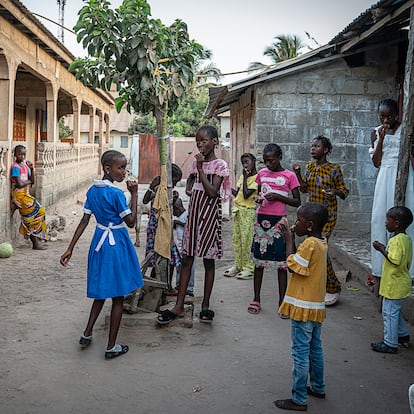A one-month-old baby bleeds to death after genital mutilation in Gambia.

A one-month-old baby bled to death this Sunday in Gambia after allegedly undergoing female genital mutilation (FGM) . The baby was rushed to the Bundung Maternity Hospital in Banjul, the country's capital, but was already dead by the time she arrived, according to police, who are investigating the incident. Two women have been arrested and are being questioned. FGM, or clitoris cutting, has been banned in Gambia since 2015 , but some continue to secretly perform it on very young girls to circumvent the law. This death has sparked a wave of outrage in the country.

Pending a forensic report, the police revealed that "preliminary evidence indicates that the child was subjected to genital mutilation, which caused severe bleeding." The incident occurred in Wellingara, a neighborhood in Banjul. Abdoulie Ceesay, a member of the National Assembly, condemned the death, calling it devastating and unacceptable, and called for a swift investigation in a statement. "The tragic death of this one-month-old baby, allegedly due to complications related to female genital mutilation, causes me deep sorrow and outrage. Let me be clear: I am not against religion or culture. I deeply respect the rich traditions and spiritual values that shape our communities. However, I do not and cannot support genital mutilation. Culture can never be used to justify violence, and faith can never be distorted to cause harm," he stated.
It's important that diverse actors unite to defend the law against FGM. Now is the time to choose between protecting girls or abandoning them to an avoidable fate.
Santana Simiyu, human rights lawyer at Equality Now
Santana Simiyu, a human rights lawyer at Equality Now , which has been on the front lines of the fight against genital mutilation in Gambia, says this death is “a devastating reminder” of the dangers of FGM. “No girl should suffer or lose her life because of a practice that deprives her of health, safety, and dignity. Yet, even as we mourn, Gambia’s Supreme Court is hearing a case that could overturn the very law that protects women and girls from this harm,” she explains. “If the FGM law is repealed, tragedies like this will become increasingly common. This is not the time to reduce protections, but to strengthen them. Girls’ lives and their futures depend on it. It is important that diverse actors come together to defend the FGM law. Now is the time to choose between protecting girls or abandoning them to an avoidable fate,” she warns.
Along the same lines, Fatou Baldeh, head of the organization Women in Leadership and Liberation (WILL) , stated in a statement that "culture is no excuse, tradition is no shield, this is violence, pure and simple." FGM, which consists of the total or partial removal of the clitoris or female genital organs for non-medical reasons, is a cultural practice that persists in some thirty countries around the world, primarily in Africa, Asia, and the Middle East. According to UNICEF, 73% of Gambian women between the ages of 15 and 49 have undergone it, making it one of the ten countries in the world with the highest incidence. In 2015, Gambia passed a law prohibiting genital mutilation , as have 70 other countries around the world, an important step in the fight against this practice.
Although female genital mutilation (FGM) has continued to be performed secretly and on increasingly younger girls, no convictions were issued until 2023. That year, a judge fined three women €217 or sentenced them to one year in prison for performing female genital mutilation on eight girls. The ruling sparked an angry reaction from conservative imam Abdoulie Fatty, who paid the fine imposed to release them from prison and launched an aggressive campaign against the ban, joined by members of parliament and community leaders. In March 2024, the Gambian Parliament initially approved a bill to decriminalize FGM.
According to Unicef, 73% of Gambian women between the ages of 15 and 49 have undergone FGM, making it one of the ten countries in the world with the highest incidence.
However, the initiative was put on hold pending a report from a parliamentary committee. For four months, human rights and child protection organizations mobilized to stop the bill. The debate was intense in Gambia, but finally, on July 15, 2024, Parliament rejected the repeal of the law by 33 votes to 19. That day, Fatou Baldeh recalled that “this is by no means a victory, since five out of ten girls under the age of 14 have been subjected to FGM and seven out of ten women between the ages of 15 and 49 have already been mutilated (…) We must ensure that this law is effectively implemented. It took eight years from its enactment to obtain a conviction, despite the fact that FGM was practiced with impunity. This cannot happen in the future.”
According to Simiyu, the attempt to lift the ban failed “thanks to the resistance of a strong feminist movement and civil society organizations that has developed over a long period in the country, as well as the collective efforts of women's and girls' rights groups, the media, and international actors, both in Gambia and globally.” However, the lawyer recalls that after the failure of the repeal bill, the constitutionality of the Women's Amendment Act of 2015 was immediately challenged before the Supreme Court of Gambia, where the petition is still pending.
EL PAÍS




